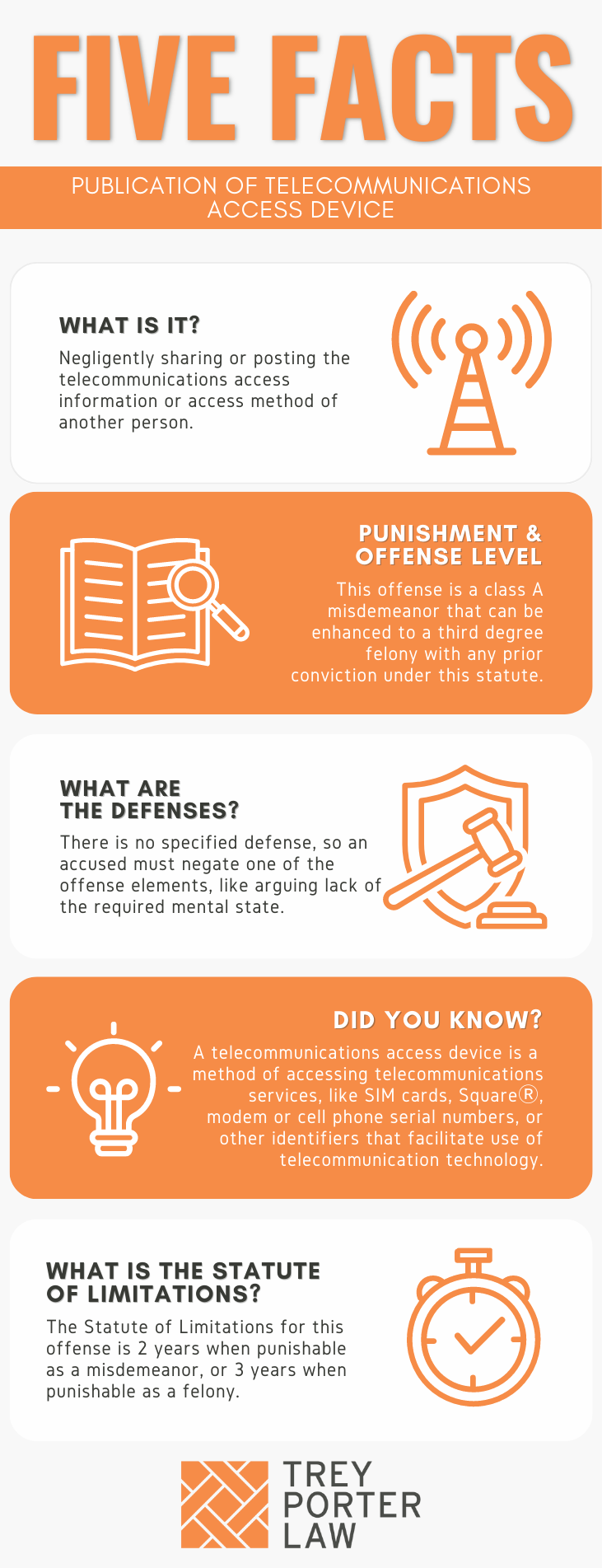WHAT IS PUBLICATION OF TELECOMMUNICATIONS ACCESS DEVICE IN TEXAS?
The Texas law against publication of telecommunications access device prohibits negligently disseminating another’s information or method used to access a telecommunications device or service.
- What is a telecommunications access device? Texas Penal Code Section 33A.01 defines “telecommunications access device” as “an instrument, device, card, plate, code, account number, personal identification number, electronic serial number, mobile identification number, counterfeit number, or financial transaction device that alone or with another telecommunications access device can acquire, intercept, provide, receive, use, or otherwise facilitate the use of a telecommunications device, counterfeit telecommunications device, or telecommunications service.”A telecommunications access device is a method of accessing a telecommunications service, such as a SIM card, SquareⓇ, modem or cell phone serial numbers, or any other identifier used to facilitate one’s use of telecommunication technology.
WHAT IS THE PUBLICATION OF TELECOMMUNICATIONS ACCESS DEVICE LAW IN TEXAS?
Tex. Penal Code § 33A.05. PUBLICATION OF TELECOMMUNICATIONS ACCESS DEVICE.
(a) A person commits an offense if the person with criminal negligence publishes a telecommunications access device or counterfeit telecommunications access device that is designed to be used to commit an offense under Section 33A.04.
(b) Except as otherwise provided by this subsection, an offense under this section is a Class A misdemeanor. An offense under this section is a felony of the third degree if the person has been previously convicted of an offense under this chapter.
WHAT IS THE PENALTY CLASS FOR PUBLICATION OF TELECOMMUNICATIONS ACCESS DEVICE IN TEXAS?
The penalty classification for the first offense of publication of a telecommunications access device is a Class A misdemeanor, punishable by up to one year in county jail. If a person has been previously convicted of a telecommunications crime, a subsequent charge of publishing a telecommunications access device is a third degree felony, punishable by two to ten years in prison.
WHAT IS THE PUNISHMENT RANGE FOR PUBLICATION OF TELECOMMUNICATIONS ACCESS DEVICE IN TEXAS?
The punishment range for publication of a telecommunications access device charged as a Class A misdemeanor is up to one year in jail, and a maximum $4,000 fine. If charged as a third degree felony, the punishment range is two to ten years in prison, and a maximum $10,000 fine.
WHAT ARE THE PENALTIES FOR PUBLICATION OF TELECOMMUNICATIONS ACCESS DEVICE IN TEXAS?
A person charged with publication of a telecommunications access device may be eligible for probation after a conviction, or deferred adjudication without a conviction. The period of community supervision for a Class A misdemeanor may not exceed two years.
A person charged with third degree felony publication of a telecommunications access device may be placed on probation for a term between two and five years, or deferred adjudication for up to ten years.
WHAT ARE THE DEFENSES TO PUBLICATION OF TELECOMMUNICATIONS ACCESS DEVICE IN TEXAS?
The statute does not authorize specific defenses to publication of a telecommunications access device. A person accused thereof may attempt to negate at least one of the elements the State must prove at trial.
WHAT IS THE STATUTE OF LIMITATIONS FOR PUBLICATION OF TELECOMMUNICATIONS ACCESS DEVICE IN TEXAS?
The limitation period for publication of a telecommunication access device categorized as a Class A misdemeanor is two years. If charged as a third degree felony, the limitation period is three years.
PUBLICATION OF TELECOMMUNICATIONS ACCESS DEVICE IN TEXAS
Negligently disclosing another’s personal information used to access a telecommunications device or service is punishable as a Class A misdemeanor in Texas, unless a person has a previous conviction for a telecommunications crime, in which case it is a felony.













